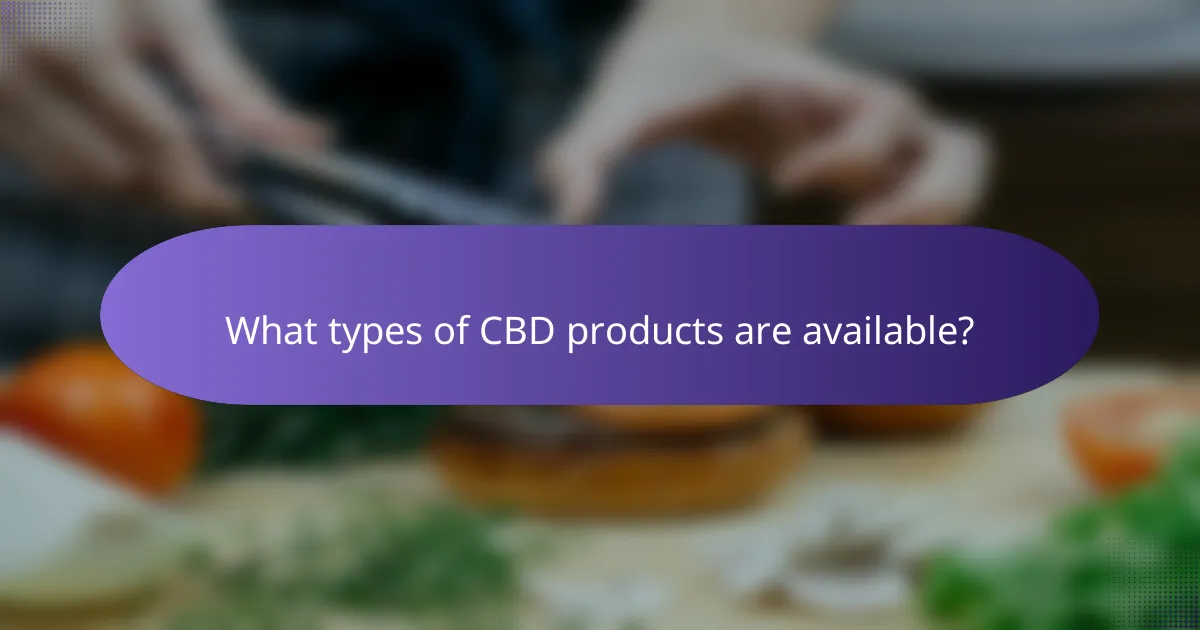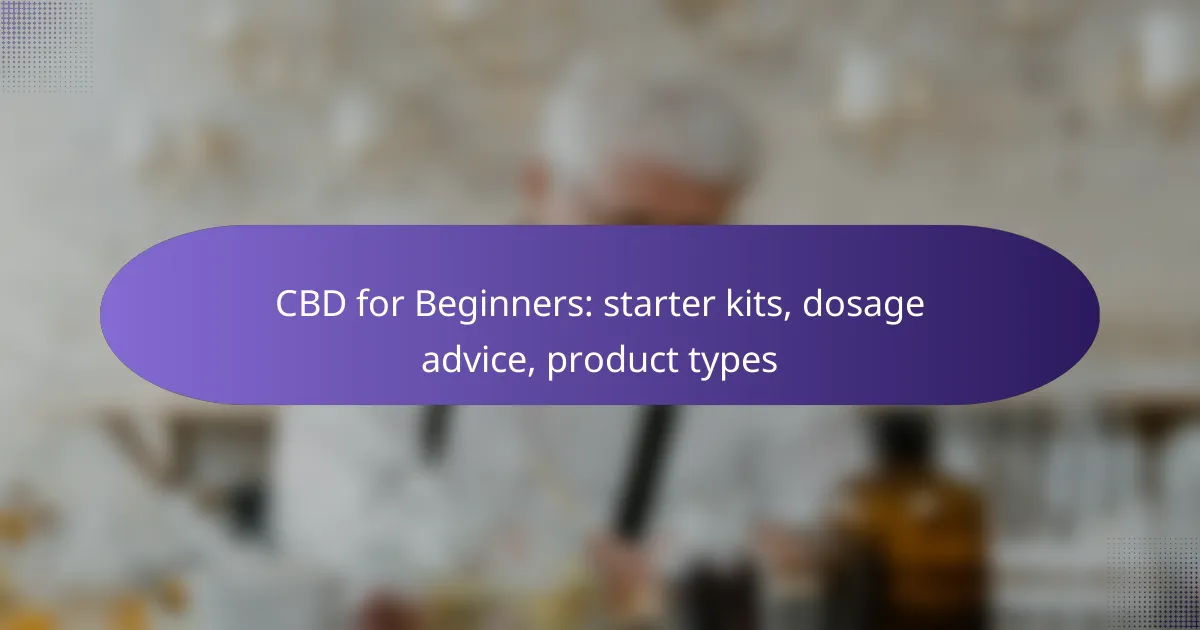For those new to CBD, starter kits offer a convenient way to explore various products and find the right dosage for your needs. These kits typically include items like oils, gummies, and capsules, making it easier to begin your CBD journey. It’s important to start with a low dosage and adjust based on your body’s response, as individual factors can influence what works best for you. With a range of product types available, including oils and topicals, there’s something to suit every preference and requirement.

What are the best CBD starter kits for beginners?
The best CBD starter kits for beginners provide a convenient way to explore different products and find the right dosage. These kits typically include a variety of items such as oils, gummies, or capsules, making it easier to start your CBD journey.
Charlotte’s Web Starter Kit
The Charlotte’s Web Starter Kit is designed for those new to CBD, featuring a selection of their popular products. This kit often includes a full-spectrum oil, which is known for its potential benefits due to the presence of various cannabinoids.
When using this kit, beginners should start with a low dosage, typically around 15 mg per serving, and gradually adjust based on their individual response. It’s advisable to keep a journal of your experiences to find the optimal dosage for your needs.
CBDistillery Starter Bundle
The CBDistillery Starter Bundle offers a range of products, including tinctures and gummies, suitable for beginners. This bundle allows users to experience different forms of CBD, which can help in determining personal preferences.
For effective use, beginners should begin with the recommended serving size on the product labels, usually around 10-30 mg per day. Monitoring how you feel after each dose can guide you in adjusting your intake as needed.
Joy Organics CBD Starter Pack
The Joy Organics CBD Starter Pack is an excellent choice for those seeking high-quality, organic CBD options. This kit typically includes a broad-spectrum oil and softgels, which are easy to consume and ideal for on-the-go use.
New users should consider starting with a low dose, such as 10 mg per softgel, and can increase gradually based on their comfort level. It’s important to consult with a healthcare professional if you have any underlying health conditions or are taking other medications.

How do I determine the right CBD dosage?
Determining the right CBD dosage involves starting with a low amount and gradually adjusting based on your body’s response. Individual factors such as body weight and health conditions can also influence the optimal dosage.
Start low and go slow
When beginning with CBD, it’s advisable to start with a low dosage, typically around 5-10 mg per day. This cautious approach allows you to gauge how your body reacts without overwhelming it.
After a week or so, if you feel comfortable, you can gradually increase the dosage by 5 mg at a time. This method helps in finding the sweet spot that works for you without experiencing unwanted side effects.
Consider body weight
Your body weight plays a significant role in determining the right CBD dosage. A common guideline suggests taking 1-6 mg of CBD for every 10 pounds of body weight. For instance, a person weighing 150 pounds might start with a dosage between 15-90 mg per day.
Keep in mind that individual metabolism and sensitivity to CBD can vary, so adjustments may be necessary based on personal experience.
Consult with a healthcare professional
Before starting any CBD regimen, it’s wise to consult with a healthcare professional, especially if you have pre-existing health conditions or are taking other medications. They can provide personalized advice and help avoid potential interactions.
A healthcare provider can also assist in determining the appropriate dosage based on your specific health needs, ensuring a safer and more effective experience with CBD.

What types of CBD products are available?
CBD products come in various forms, each offering unique benefits and methods of consumption. The most common types include oils, gummies, and topicals, catering to different preferences and needs.
CBD oils and tinctures
CBD oils and tinctures are liquid extracts that can be taken sublingually (under the tongue) for quick absorption. They typically come in dropper bottles, allowing for precise dosage control. Users often appreciate the versatility of oils, as they can be added to food or beverages.
When choosing a CBD oil, consider the concentration, which can range from around 5% to over 30%. Start with a lower concentration and gradually increase as needed, paying attention to how your body responds.
CBD gummies
CBD gummies are chewable candies infused with CBD, making them a popular choice for those who prefer a tasty and discreet option. They provide a pre-measured dose of CBD, typically ranging from 5 mg to 25 mg per gummy, which simplifies dosage management.
While gummies are convenient, they may take longer to take effect compared to oils, as they must be digested first. It’s advisable to wait at least an hour after consumption before deciding to take more.
CBD topicals
CBD topicals include creams, balms, and lotions designed for application directly onto the skin. They are ideal for targeting localized discomfort, such as muscle soreness or joint pain, without entering the bloodstream. Topicals often contain additional ingredients like menthol or essential oils for enhanced effects.
When using CBD topicals, apply a generous amount to the affected area and massage it in thoroughly. Start with a small amount and increase as needed, observing how your skin reacts to the product.

How do I choose the right CBD product for me?
Choosing the right CBD product involves understanding your personal health needs, evaluating product quality, and ensuring safety through third-party testing. By considering these factors, you can make an informed decision that aligns with your wellness goals.
Identify your health goals
Start by clearly defining what you want to achieve with CBD. Common health goals include managing anxiety, alleviating pain, improving sleep quality, or enhancing overall wellness. Knowing your specific needs will guide you in selecting the most suitable product type and dosage.
For instance, if you’re looking to reduce anxiety, a product with a higher concentration of CBD may be beneficial. Conversely, if you’re seeking general wellness support, a lower dose may suffice.
Evaluate product reviews
Product reviews can provide valuable insights into the effectiveness and quality of CBD products. Look for reviews from verified purchasers to ensure authenticity. Pay attention to comments regarding the product’s efficacy, taste, and any side effects experienced.
Consider checking multiple sources, including online retailers and independent review sites, to get a well-rounded perspective. High ratings and positive feedback can indicate a reliable product, while consistent complaints may signal potential issues.
Check for third-party lab testing
Third-party lab testing is crucial for verifying the quality and safety of CBD products. Reputable brands will provide lab results that confirm the product’s cannabinoid content and check for contaminants like heavy metals or pesticides.
When selecting a product, look for a Certificate of Analysis (COA) from an independent lab. This document should be easily accessible on the brand’s website or upon request. Ensuring that a product has been rigorously tested can help you avoid low-quality or unsafe options.

What are the legal considerations for CBD in the US?
In the United States, the legal landscape for CBD is complex and varies significantly by state. While federally, CBD derived from hemp is legal, individual states may impose their own regulations that can affect its sale, use, and distribution.
Federal regulations
Under the 2018 Farm Bill, CBD products derived from hemp containing less than 0.3% THC are legal at the federal level. However, the FDA has not yet established comprehensive regulations for CBD in food and dietary supplements, leading to uncertainty for consumers and manufacturers alike.
It is crucial to ensure that any CBD product complies with federal guidelines, including proper labeling and testing for THC content. Products that do not meet these standards may be subject to enforcement actions by federal agencies.
State-specific laws
Each state has its own laws regarding the sale and use of CBD, which can range from fully legal to heavily restricted. For instance, some states allow CBD in food and beverages, while others do not permit it at all.
Before purchasing or using CBD, check your state’s specific regulations. Websites of state health departments often provide up-to-date information on local laws concerning CBD products.
Age restrictions
Many states impose age restrictions on the purchase of CBD products, typically requiring buyers to be at least 18 or 21 years old. These restrictions can vary, so it is essential to verify the age requirements in your state.
Retailers may ask for identification to ensure compliance with these age restrictions. Failing to adhere to these laws can result in penalties for both the seller and the buyer.

What are the potential side effects of CBD?
CBD can cause a variety of side effects, although many users tolerate it well. Common side effects include dry mouth and fatigue, which may vary in intensity depending on the individual and the dosage used.
Dry mouth
Dry mouth, often referred to as “cottonmouth,” is a frequent side effect of CBD consumption. This occurs because CBD can inhibit saliva production, leading to a parched feeling in the mouth.
To mitigate dry mouth, consider staying hydrated by drinking water before and after taking CBD. Chewing sugar-free gum or sucking on hard candies can also help stimulate saliva production.
Fatigue
Fatigue is another potential side effect of CBD, particularly at higher doses. Some users report feeling drowsy or lethargic, which may affect their daily activities.
If you experience fatigue after taking CBD, it may be beneficial to adjust your dosage or timing. Taking CBD in the evening or before bed can help those who find it makes them sleepy, while lower doses may be more suitable for daytime use.
